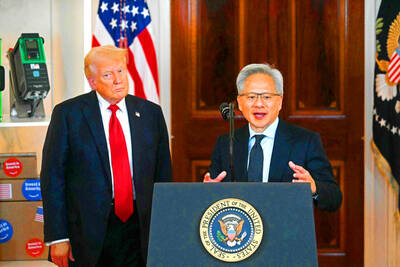Shares of BenQ Corp (
The company's stock fell 3.9 percent to close at NT$12.50 on the Taiwan Stock Exchange, the lowest since Jan. 6, 1997.
The Economic Daily News, a Chinese-language newspaper, reported yesterday that Martin Prager, the insolvency administrator of German unit BenQ Mobile, will soon file the claim to the parent company.
The report raised concerns that the mobile-phone unit BenQ bought in 2005 from Siemens AG may further erode earnings after driving the Taiwanese parent to a record loss last year. The German handset maker, once the industry's third-largest producer, is being liquidated after losing market share to larger rivals such as Nokia Oyj and Motorola Inc.
"BenQ won't be able afford to pay all this debt if this becomes a reality," Arthur Hsieh (
BenQ hasn't received any claims from the German subsidiary or the insolvency administrator so far, Jean Hsu (
About 4,350 creditors of BenQ Mobile, the German unit, have registered total debt claims of 1.2 billion euros, or quadruple the estimated value of its assets, the Central News Agency reported on Thursday, citing Prager.
Creditors of the insolvent company include Brazilian soccer star Ronaldo, the report said.
BenQ had hired the three-time soccer player of the year to feature in commercials for BenQ Mobile, which in 2005 was the sponsor for Spain's Real Madrid, Ronaldo's team at the time.
BenQ reported a record annual loss of NT$27.61 billion (US$836 million) earlier this week after its purchase of the German unit failed to raise profit or sales. The deficit wiped out any profit the company had made since 1999.
Liquidation proceedings for BenQ Mobile began in January after a three-month search for a new investor ended without success.
The bankruptcy affects more than 3,000 workers in Germany and has hurt suppliers from chipmaker Infineon Technologies AG to phone parts makers Perlos Oyj and Balda AG.
Yesterday's drop drove the stock below the previous 10-year low set last week after Taiwanese prosecutors investigated possible insider trading by BenQ officials.

Taiwan Semiconductor Manufacturing Co (TSMC, 台積電) last week recorded an increase in the number of shareholders to the highest in almost eight months, despite its share price falling 3.38 percent from the previous week, Taiwan Stock Exchange data released on Saturday showed. As of Friday, TSMC had 1.88 million shareholders, the most since the week of April 25 and an increase of 31,870 from the previous week, the data showed. The number of shareholders jumped despite a drop of NT$50 (US$1.59), or 3.38 percent, in TSMC’s share price from a week earlier to NT$1,430, as investors took profits from their earlier gains

AI TALENT: No financial details were released about the deal, in which top Groq executives, including its CEO, would join Nvidia to help advance the technology Nvidia Corp has agreed to a licensing deal with artificial intelligence (AI) start-up Groq, furthering its investments in companies connected to the AI boom and gaining the right to add a new type of technology to its products. The world’s largest publicly traded company has paid for the right to use Groq’s technology and is to integrate its chip design into future products. Some of the start-up’s executives are leaving to join Nvidia to help with that effort, the companies said. Groq would continue as an independent company with a new chief executive, it said on Wednesday in a post on its Web

CHINA RIVAL: The chips are positioned to compete with Nvidia’s Hopper and Blackwell products and would enable clusters connecting more than 100,000 chips Moore Threads Technology Co (摩爾線程) introduced a new generation of chips aimed at reducing artificial intelligence (AI) developers’ dependence on Nvidia Corp’s hardware, just weeks after pulling off one of the most successful Chinese initial public offerings (IPOs) in years. “These products will significantly enhance world-class computing speed and capabilities that all developers aspire to,” Moore Threads CEO Zhang Jianzhong (張建中), a former Nvidia executive, said on Saturday at a company event in Beijing. “We hope they can meet the needs of more developers in China so that you no longer need to wait for advanced foreign products.” Chinese chipmakers are in

POLICY REVERSAL: The decision to allow sales of Nvidia’s H200 chips to China came after years of tightening controls and has drawn objections among some Republicans US House Republicans are calling for arms-sale-style congressional oversight of artificial intelligence (AI) chip exports as US President Donald Trump’s administration moves to approve licenses for Nvidia Corp to ship its H200 processor to China. US Representative Brian Mast, the Republican chairman of the US House Committee on Foreign Affairs, which oversees export controls, on Friday introduced a bill dubbed the AI Overwatch Act that would require the US Congress to be notified of AI chips sales to adversaries. Any processors equal to or higher in capabilities than Nvidia’s H20 would be subject to oversight, the draft bill says. Lawmakers would have